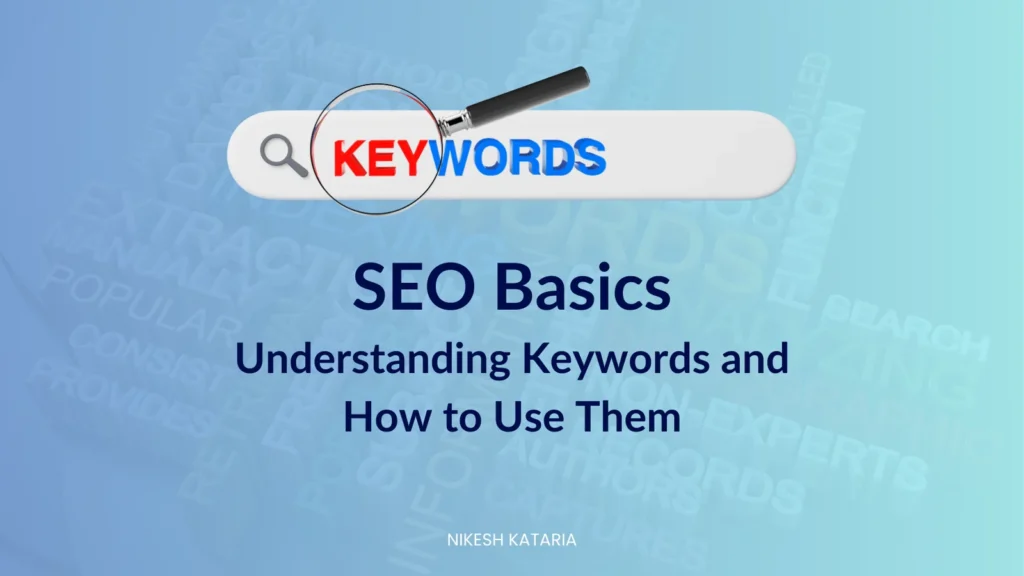What are Keywords?
Keywords are the words and phrases that people type into search engines when they’re looking for information. In SEO, keywords are essential because they help search engines understand the content of your website and match it with user queries.
Why are Keywords Important?
Keywords are the bridge between what people are searching for and the content you provide. By targeting the right keywords, you can:
- Increase Visibility: Improve your chances of appearing in search engine results.
- Attract Relevant Traffic: Bring in visitors who are specifically looking for what you offer.
- Boost Engagement: Engage users with content that meets their needs and interests.
Types of Keywords
- Short-Tail Keywords: These are broad, one or two-word phrases (e.g., “SEO”). They have a high search volume but are highly competitive.
- Long-Tail Keywords: These are more specific phrases, usually three or more words (e.g., “how to use SEO keywords”). They have lower search volume but are less competitive and more targeted.
- LSI Keywords (Latent Semantic Indexing): These are related terms and synonyms that search engines use to understand the context of your content.
How to Find Keywords
- Brainstorm: Think about what your audience might be searching for related to your topic.
- Use Keyword Research Tools: Tools like Google Keyword Planner, Ubersuggest, and Ahrefs can help you find popular keywords and analyze their search volume and competition.
- Analyze Competitors: Look at the keywords your competitors are targeting. Tools like SEMrush can provide insights into your competitors’ keyword strategies.
- Consider User Intent: Understand the intent behind the keywords. Are users looking for information, making a purchase, or seeking a specific service?
How to Use Keywords Effectively
- In Your Title: Incorporate your main keyword in the title of your article or page. This helps both search engines and users understand the topic at a glance.
Example: “SEO Basics: Understanding Keywords and How to Use Them” - In the Introduction: Use your main keyword in the first 100-150 words of your content. This signals to search engines what your content is about early on.
Example: “Keywords are the cornerstone of SEO. Understanding how to use them effectively can significantly boost your website’s visibility.” - Throughout the Content: Sprinkle your keywords naturally throughout the article. Avoid keyword stuffing; instead, focus on readability and relevance.
Example: “Long-tail keywords, such as ‘how to use SEO keywords,’ are less competitive and more specific, helping you attract targeted traffic.” - In Subheadings: Use keywords in your subheadings to break up the content and make it easier to read.
Example: “### Types of Keywords” and “### How to Find Keywords” - In Meta Descriptions: Write a compelling meta description that includes your main keyword. This appears in search results and can influence click-through rates.
Example: “Learn the basics of SEO and understand how to use keywords effectively to improve your website’s visibility and attract relevant traffic.” - In Your H1 Tag: Incorporate your main keyword in the H1 tag of your article. This helps both search engines and users understand the topic of your page at a glance.
- Example: <h1>SEO Basics: Understanding Keywords and How to Use Them</h1>
- In Image Alt Text: Use keywords in the alt text of your images. This helps search engines index your images and improves your chances of appearing in image search results.
Example: <img src=”seo-guide.jpg” alt=”SEO guide for beginners understanding keywords”> - In URLs: Create SEO-friendly URLs that include your main keyword.
Example: www.yoursite.com/seo-basics-understanding-keywords
Common Mistakes to Avoid
- Keyword Stuffing: Overloading your content with keywords can make it unreadable and lead to penalties from search engines.
- Ignoring User Intent: Focusing solely on keywords without considering what users are actually looking for can result in irrelevant content.
- Using Irrelevant Keywords: Targeting keywords that don’t match your content can lead to high bounce rates and low engagement.
Conclusion
Understanding and using keywords effectively is crucial for SEO success. By focusing on relevant keywords, creating high-quality content, and following best practices, you can improve your website’s visibility and attract the right audience. Remember, SEO is an ongoing process, so continually research and refine your keyword strategy to stay ahead in the game.

